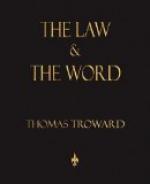Then as the meaning of that Name “the Word of God.” In Ps. cxix, 160: “Thy word is true from the beginning,” and Jesus said: “Thy Word is Truth” (John xvii, 17).
This also corresponds with the description in Rev. xix, 11-16 where another name for “the Word of God” is “Faithful and True”; and the same metaphor of the Truth “riding into action” is contained in Ps. xlv, 3, 4. “Gird thy sword upon thy thigh, O most mighty, with thy glory and thy majesty; and in thy majesty ride prosperously because of Truth.” The same symbol of “riding” also occurs in Ps. lxviii: “Extol him that rideth upon the heavens,” “Sing praises to him that rideth upon the heaven of heavens which were of old (i.e., ab initio); lo, he doth send out his Voice and that a mighty Voice”—and the word “Voice” is the Hebrew Word [Hebrew: “K[=o]l"], meaning “Sound” or “Word”—so that here again we have the idea of “The Word” riding into action. Once more—“Thou hast magnified thy Word above all thy Name” (Ps. cxxxviii, 2), thus repeating the idea of the Word as the Name.
In other passages we have the idea of the Word as a Weapon. “The Sword of the Spirit which is the Word of God” (Eph. vi, 17), which answers to the description in Revelations of the Sword proceeding out of the mouth of the Word; and we have the same metaphor of the Word riding into action in Habakkuk iii, 8 and 9. “Thou didst ride upon thine horses and thy chariots of salvation. Thy bow was made quite naked ... even thy Word”; and similarly those that oppose the Word are “killed with the sword of him that sat upon the horse, which sword proceeded out of his mouth.”
In other passages we have the Word put before us as a Defence. “His Truth shall be thy shield and buckler” (Ps. xci, 4); and again “The Name of the Lord is a strong tower; the righteous runneth into it and is safe” (Prov. xviii, 10); and we have already seen that this Name is “The Word of God”; and similarly in Ps. cxxiv, 8: “Our help is in the name of the Lord, who made heaven and earth.”




